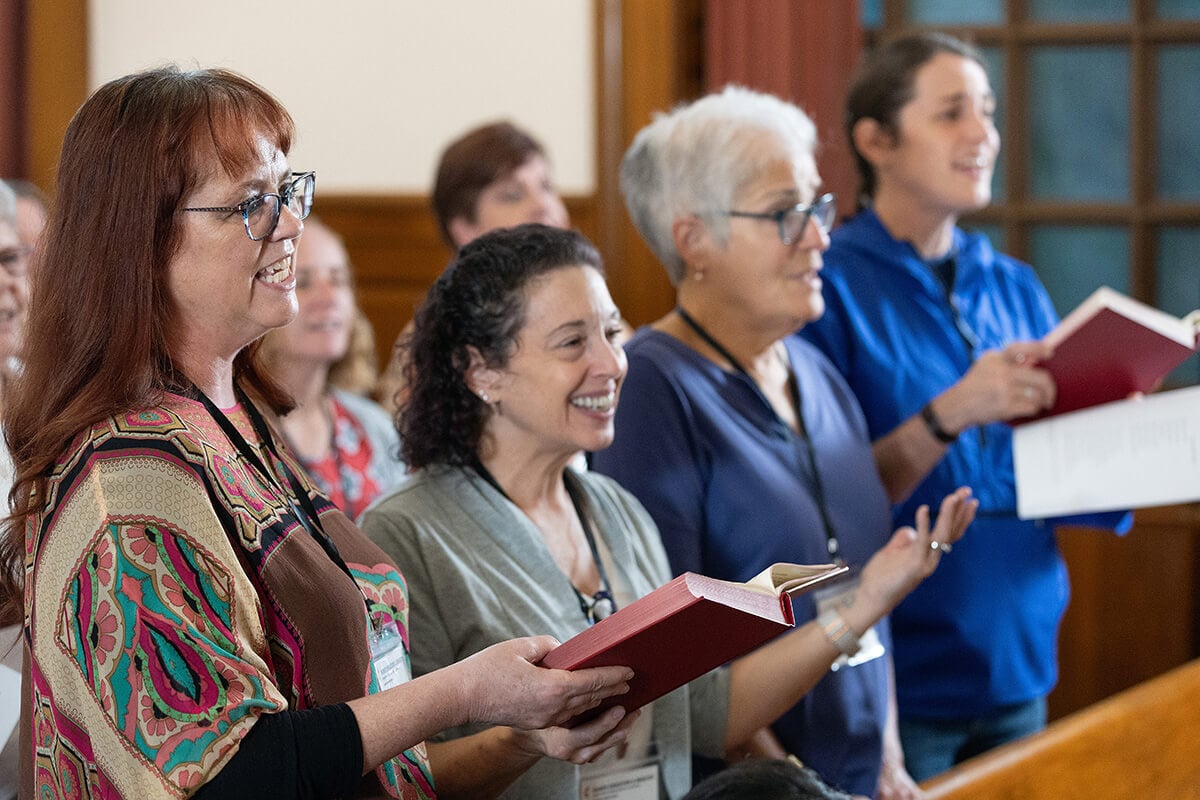Key points:
- With the approval of last year’s General Conference, ordained United Methodist deacons now can preside at the sacraments “when contextually appropriate.”
- Some 150 deacons joined to discuss best practices and what “contextually appropriate” means for their new authority.
- Many deacons feel their order remains poorly understood even as next year marks 30 years since General Conference voted for the ordination of deacons as a separate order from ordained elders.
The Rev. Laura McMasters, a longtime campus minister, performed her first baptism in February — welcoming an international student into the Christian faith and United Methodist community.
The deacon had assisted United Methodist elders in services of communion and baptism before as minister of campus and community engagement at First United Methodist Church in Pulaski, Tennessee. But this service was special.
For the first time, McMasters could offer the sacrament of Holy Baptism as a deacon on her own, without getting a special dispensation from her bishop or waiting for an ordained elder to be available.
“I had tears of joy for the student whose life was being transformed,” she said, “and for the lives of my deacon colleagues continuing to experience God’s transformation in ministry.”
McMasters was among nearly 150 United Methodist deacons, provisional deacons and deacon candidates who joined in discussing the sacraments at the Sept. 22-24 Deacons Gathering hosted by the United Methodist Board of Higher Education and Ministry. Those gathered both in Nashville and online were grappling with a significant change in denominational life.
In what many consider a historic moment, last year’s General Conference — by a vote of 448-240, a 65% majority — granted ordained deacons the authority to preside “at the celebration of the sacraments when contextually appropriate.”
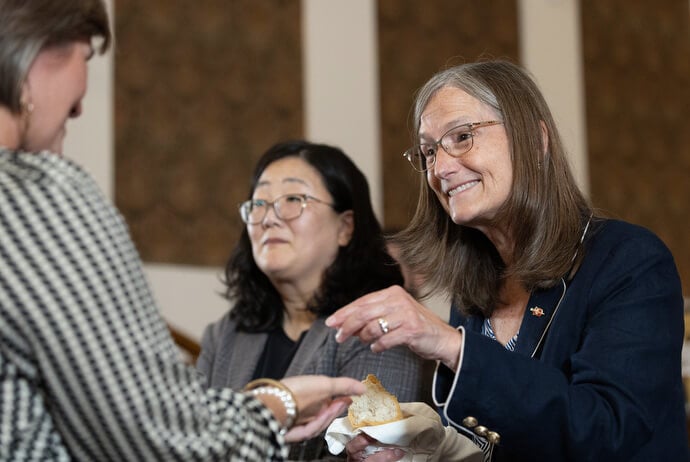
The change to the Book of Discipline, the denomination’s policy book, goes on to say that deacons have sacramental authority for the sake of “extending the mission and ministry of the church and offering the means of grace to the world…”
The Rev. Meg Lassiat, Higher Education and Ministry’s executive director of ministry and a deacon herself, emphasized that she does not see this new authority as a right.
“I believe it is a responsibility,” she told those at the event, “and we are stewards of the gift to the church and to the people we serve.”
The Rev. Emily Kincaid, a deacon who as a General Conference delegate helped move the change forward, shared a similar sentiment.
“I think where we get into trouble is when we try to own the sacraments, when we try to hoard the sacraments,” said Kincaid, executive pastor at First United Methodist Church in Pensacola, Florida.
“And so, we remember that the sacraments are a gift from God, and that the action in the sacrament is God’s action. We are simply the vessel through which God is working.”
She and other General Conference delegates worked with Higher Education and Ministry to put together a document of “Guidelines and Best Practices” for United Methodist deacons.
However, questions remain about the new policy that took effect Jan. 1 — both among the deacons themselves and within the wider denomination. Chief among those questions is what counts as “contextually appropriate.”
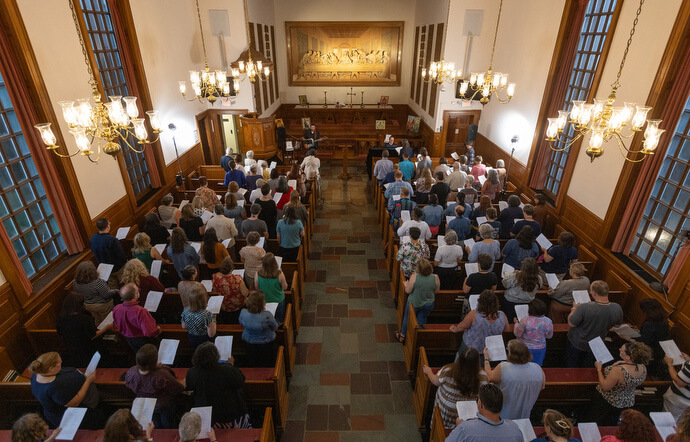
In fact, deacons say they still face confusion about their context within the larger United Methodist Church.
That’s in part because the order of deacons, as currently constituted, is still relatively new. Next year will mark 30 years since General Conference instituted deacons as a separate, permanent order of ordained clergy.
The move abolished the previous two-step ordination process of deacon and elder and opened the opportunity for diaconal ministers, lay people serving in specialized ministry, to become ordained. Ten people in the first class of deacons attended the September gathering.
The Rev. Margaret Ann Crain, a retired Garrett-Evangelical Theological Seminary professor who has written books on the ministry of deacons, was among that first class in 1997.
“From the beginning, the people who were part of those earliest negotiations in the ’90s, gave up sacrament in order to get (deacons’ ordination) through,” she told those gathered. “They were very clear; that is exactly the deal that was made. So, we’re thankful they got it through.”
Since then, she said, every ministry study “has danced closer and closer” to saying deacons’ ordination should be accompanied by sacramental responsibility. The most recent study, presented at last year’s General Conference, said ordination has a “sacramental nature.” As such, the report said, deacons and elders bear responsibility for leading the church’s sacramental life.
“I think it’s missional,” Crain said. “And if you look at the setting you’re in, and you say, ‘This is part of the mission of the church here. I want to offer this,’ then you’re fine.”
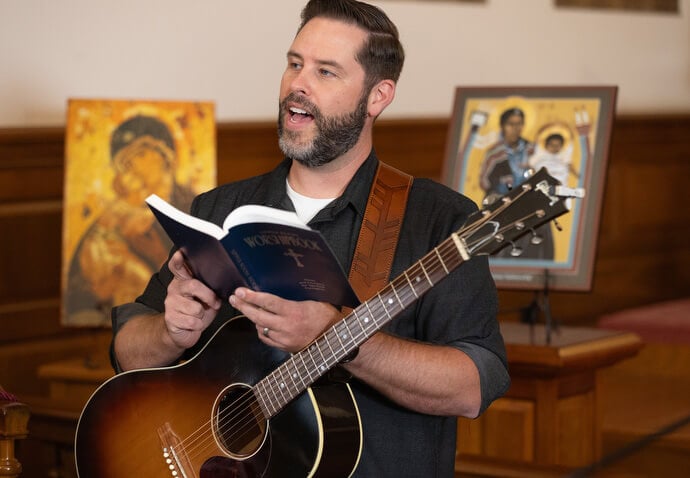
Not all geographic regions of The United Methodist Church have adopted the order of deacons and the relatively new system for ordination. But in the U.S. and Europe, United Methodist deacons should not be viewed as elders in training. Instead, they answer the call to “a lifetime ministry of word, service, compassion and justice.”
Bishop Sandra Steiner Ball, president of the Higher Education and Ministry board, described deacons as a “tether” or “ligament” between the church and the world.
“Being withdrawn from the world is no answer for Christians. That makes the church irrelevant,” the bishop, who also leads the Western Pennsylvania Conference, preached in the opening sermon. “Oh, how we need the ministry of our deacons!”
Today, the General Council on Finance and Administration reports, there are 1,023 active United Methodist deacons.
Guidance on sacraments
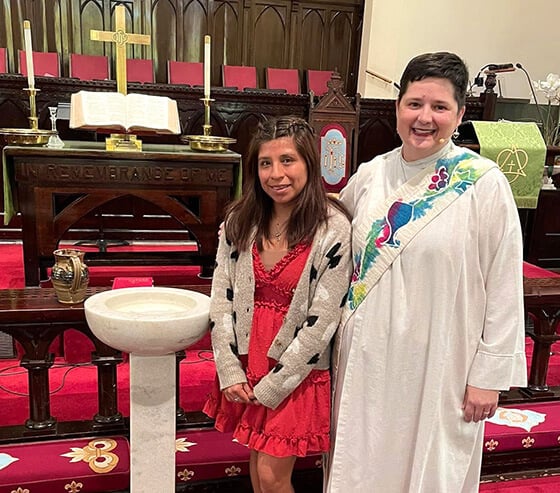
Higher Education and Ministry in collaboration with General Conference delegates who helped push the legislation forward has produced the document “UMC Deacons and Sacramental Authority — Guidelines and Best Practices.”
The Rev. Leo Yates Jr., chair of the order of deacons in the Baltimore-Washington Conference, worked with other deacon chairs to offer additional guidelines. The document includes questions deacons should consider before administering sacraments. Also included are examples of settings where deacons might be needed to extend the means of grace.
In addition to campus ministers like McMasters, you can find these deacons serving as hospital chaplains, therapists, social workers, attorneys, nonprofit directors, music ministers, Christian educators, professors, pastors and even church planters.
Any of these ministry contexts could potentially be appropriate for administering the sacraments, deacons said.
The Rev. Julie Wilson, a deacon who co-wrote the legislation, said that even before the change, she presided at communion on mission trips and as an interim pastor. But each time she had to first get her bishop’s permission.
“I have always ministered with marginalized communities,” she told UM News. “And every church I’ve been in, there have been situations where I have thought, ‘Wow, this would be the perfect time to have communion.’ But there was no elder around.’”
At the same time, many at the gathering stressed the need to continue collaborating with elders in sacramental responsibilities — especially in shared ministry contexts.
“I think we as deacons, we have to work with our elders and respect each other’s ministries,” said the Rev. Leo Yates Jr., a deacon and Wilson’s co-writer.
Yates, pastor of Magothy United Methodist Church of the Deaf in Pasadena, Maryland, has worked with an elder in officiating at six baptisms this year. At the same time, he celebrates that he now can consecrate the communion elements whenever he visits Deaf residents at a local assisted living center.
Deacons, like elders, must have a master’s or equivalent degree with graduate level studies in theology. Nevertheless, their vocation is different from that of elders, who fill the majority of United Methodist pulpits.
Elders are called to preach, provide pastoral care, administer sacraments and order the life of the church. Elders also itinerate at the behest of their bishops, who in turn are elected from the elder ranks.
The United Methodist Church also has a third order of clergy — local pastors — who are licensed but not ordained. Licensed local pastors can administer baptism and communion, but only in their appointment setting. The Higher Education and Ministry agency plans to explore local pastors’ ministry more in the next few years.
For deacons, service is key. The word deacon derives from the Greek word diakonos, which the New Testament often uses to mean servant or messenger. The symbol of deacons’ ministry is a towel and basin, representing Jesus washing his disciples’ feet.
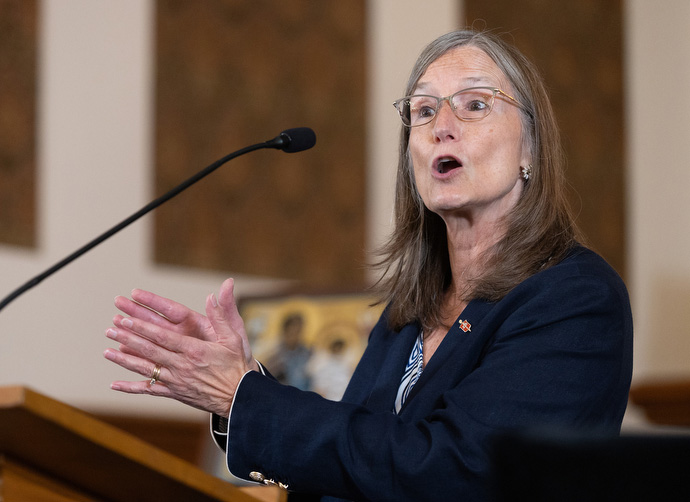
The Deacons Gathering also focused on another Bible story — the account of Philip sharing the good news of Jesus with an Ethiopian eunuch. As the Book of Acts tells it, the eunuch — after hearing the Gospel — points to a nearby body of water and asks, “What is to prevent me from being baptized?” Philip responds by baptizing the Christian convert.
McMasters, the campus minister, faced a similar situation in her ministry at Pulaski First United Methodist and the nearby University of Tennessee Southern, formerly Martin Methodist College. “It’s a cool story all around,” she said.
Subscribe to our
e-newsletter
The international student, Shelya Zambrano, first showed up two years ago to help the university’s Wesley Foundation pack food boxes for hungry neighbors. That day concluded with a service of Holy Communion, and McMasters asked Zambrano if she had ever participated in communion before. The student stunned McMasters when she replied, “I’ve never been to church before.”
In the following months, that changed. Under McMasters’ leadership, the student became a regular participant in the church’s ministry and came to embrace faith in Christ.
“As a deacon, my call has been and continues to be reminding people what we can do in our context to be more like Jesus in serving and connecting our neighbors to share our gifts and resources in hopes of all experiencing God’s love and grace,” she said.
She sees her baptism of Zambrano as part of that ministry.
The Rev. Quinton De Beer, associate pastor at Carlisle United Methodist Church in Pennsylvania, is a provisional deacon who found much to appreciate about the gathering. He said the gift he takes away is a better understanding of sacraments as a means of grace available to all.
“I think it dismantles some of the religiosity of the church and allows all people to have access to Christ,” he said.
Hahn is assistant news editor for UM News. Contact her at (615) 742-5470 or [email protected]. To read more United Methodist news, subscribe to the free UM News Digest.

